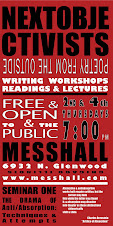The whalebone sieves the whale food
From the plankton, the plankton
Finally dissolves the whale,
Liberating the whalebone.
Liberty is the mother
Not the daughter of order.
-- Kenneth Rexroth, The Phoenix and the Tortoise
I.
Kenneth Rexroth was hard for us to like. Just coming off poetries of razor concision (Creeley, Niedecker) and dense experimental language (Dorn, Zukofsky), Rexroth's swells of plaintive descriptions embarrassed and repelled us.
In “A Letter to William Carlos Williams,” Rexroth's cloudy sentiment pukes forth mostly filler phrases and dropped names:
“You're in the Fioretti
Somewhere, for you're a fool, Bill,
Like the Fool in Yeats, the term
Of all wisdom and beauty.
It's you, stands over against
Helen in all her wisdom
Solomon in all his glory.”
“He was a great man. He knew
It was beautiful then, although
Nobody else did, back there
In the Dark Ages...”
Yeats and Helen? Wisdom and beauty? Was a great man?
As readers we were like, Oh come on.
II.
So we worked at clarifying our revulsions. We agreed we saw both pap and strong passages, which was perplexing, so we looked for exactly what was awkward.
We found a few things:
- Embarrassment at the eroticism and florid language, the saying too much
- Skepticism about meter as allowing – even inspiring -- excessive and imprecise language, and a smug metrical satisfaction with otherwise messy thought.
- Concern about descriptive naming of an entire landscape, of renaming a mentor, of superfluous description as a patriarchal naming-and-cataloguing exercise which rexroth then strains through his own hardlined metaphoric purposes
- Name dropping philosophers. Seems kind of cheap and gross.
We developed some postulates for his intent, or ways to try coming-back-around or moving forward from this reading.
The first is simply to anchor his poems in their historical moment, where chaotic excess of language offered alternatives to the repressed condensed line, and where a panoramic interest in landscape and international conflict maybe argued against the internal focus of the confessional lyric. This gets him off the hook, but its too simplistic.
A second angle is his compulsion to speak in full recognition of the articulatory task's futility and potential for humiliation. From this perspective, he is opting to write a poetry that is celebratory and sappy and doesn't bother to hide it, eschewing the violent excision of macho minimalism:
“The historian differs from
The poet in this: the historian
Presents what did happen, the poet,
What might happen. For this reason
Poetry is more philosophic
Than history, and less trivial.
Poetry presents generalities,
History merely particulars.”
“Remember years ago, when
I told you you were the first
Great Franciscan poet since
The Middle Ages? I disturbed
the even tenor of dinner.
Your wife throught I was crazy.
Its true, though. And you're pure, too.”
From the angle of attempting to say everything with unfocused feeling, Rexroth's a poor fit with the Objectivists. But its interesting that he goes for the loaded, awful subject, and that we react from a place of saturated sense -- the dead body of the soldier in the waves is less repulsive to us than the sentimentalized flesh of the live erotic female body. Because dead is true and sexy is invented? The place of discomfort with the poetry is interesting, anyway.
III.
Still, what good is creating giant, cringey poems that “own” their problems if they are awful to get through?
Looking at his later works – especially the ingenious Bestiary he created for his daughters -- suggests the project might have moved forward. In a task so literal and edenic-patriarchal as the Naming of All Animals, Rexroth locates the anxiety and embarrassment of the pater-descriptor's powers as the central subject of the poems - a far better, funnier alternative than saddling the reader with its awkward by-products.
I'm not sure this fully revives the 28 loooooooong pages of the Phoenix and the Tortoise, with “Hippias and Socrates / Contending for the title/ Of Most Autonomous Greek”, and “Egyptian chisels” taking on “the vast onion of the actual”. But we do see in Rexroth a place where the attempt to transcribe objectively dissolves in the anxiety of the transcribers role and the soft hearted impulse to “glorify” in poetry.
Either way, he leads us forward in two important ways:
1) preparing us for next week's reading of Ezra Pound, the ultimate executor of a project to Name Everything in All Possible Ways.
2) the assignment to write poems “with love and admiration” for our own hero/mentors.
One funny effect of reading critically to then write imitatively is the continual return to the humility of poetic effort. Will we do any better than Rexroth attempting to write sincere admiration and stay out of the syrup? We'll see.




Your opinions on certain KR's poems are interesting to read.
ReplyDeleteHowever, where is the definition of "objectivist poetry" that you are using to evaluate his writing?
Also, why ignore the KR poetry that Zukofsky actually included in the Objectivist issue of Poetry or in the stand-alone anthology he (Zuk) edited?
Rexroth / objectivism is an important topic. I think in part you missed the mark here.